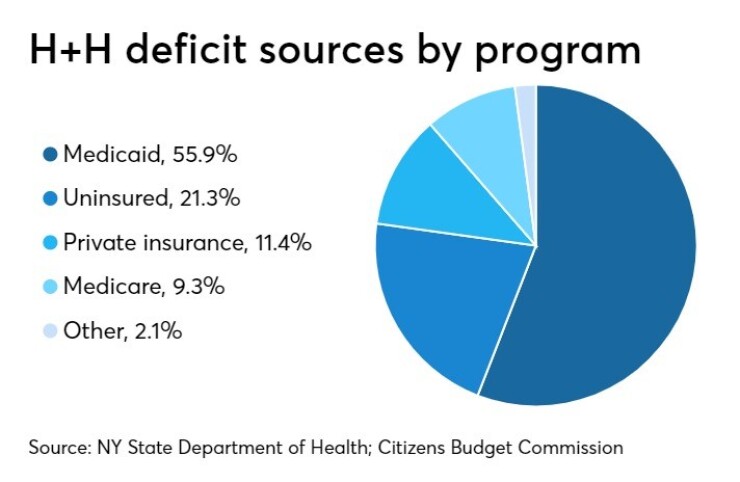Gov. Andrew Cuomo’s warnings that cities could absorb more Medicaid costs have triggered questions about the effects on New York City’s budget.
Cuomo, in his State of the State address last week, suggested such a move would be necessary to close a projected $6 billion budget gap, two-thirds of which is tied to the Medicaid program for low-income people. The state covers about $2 billion of New York City’s costs.
To close the gap, the governor suggested redistributing education aid and other measures.

“The local governments still administer their local program, even though they no longer share the costs — and we have seen dramatically higher cost increases recently,” Cuomo said. “You cannot separate administration from accountability. It is too easy to write the check when you don't sign it.”
New York Mayor Bill de Blasio is expected to release his fiscal 2021 preliminary budget late this month or early next. He expects the legislature to push back on behalf of municipalities statewide.
“They fought back a lot of efforts before. It's not the first time we've heard proposals from Albany to cut our Medicaid dollars and spending on healthcare. And a lot of times legislators fought them back,” de Blasio said Friday. “So I'm going to remain hopeful on that front.”
Medicaid is consuming a higher percentage of state spending, according to the Pew Charitiable Trusts. States together spent 17.1% of their revenue on Medicaid in fiscal 2017, or $228.2 billion — $7.8 billion or 3.5% more than in 2016.
Percentages in 13 states reached a new high, Pew said, including in eight that chose to expand coverage under the federal Affordable Care Act.
In Connecticut, state officials and hospitals reached a $1.8 billion settlement that ends legal bickering and saves the state about $4 billion in potential liability.
Lawmakers last month approved a seven-year agreement that Gov. Ned Lamont, Attorney General William Tong and the Connecticut Hospital Associated crafted. The hospitals and state feuded over a “provider tax” imposed in 2012 under former Gov. Dannel Malloy’s administration.
The new deal will provide for Medicaid rate increases of 2% for inpatient services in hospitals and 2.2% for most other services through 2026.
In New York City, Medicaid reductions could further strain the operating budget of its Health + Hospitals unit, which has been running deficits annually.
H+H. with a nearly $8 billion annual budget, operates 11 acute care hospitals, multiple clinics and long-term care facilities. In a typical year, it provides 192,000 acute inpatient admissions and 3.4 million clinic visits, 17% and 49% of the respective citywide totals.
Watchdog Citizens Budget Commission has called on H+H to overhaul its own funding mechanisms.
According to CBC, a multiyear, benchmarked approach could reduce a three-year deficit by up to $1.8 billion. The city’s Office of Management and Budget and H+H leadership “should develop a new approach to financial planning and budgeting,” it said in a report.
The Independent Budget Office estimates city support to H+H in fiscal 2019 was $1.7 billion, up from $359 million in FY2009, and projected to reach $2.3 billion in fiscal year 2023.

“It’s creating an increasing deficit for the city and is really a pressure point,” said Howard Cure, director of municipal bond research for Evercore Wealth Management.
Mitchell Katz, H+H chief executive since January 2018, has been executing de Blasio’s transformation plan for an agency long synonymous with inefficiency, union pushback, scandals and management fiascoes. Katz, a Brooklyn native who has overseen health systems in San Francisco and Los Angeles, has cited progress in revenue gains and expense reductions.
“I think he’s trying to do some productive things as far as improvements like collections and internal policies,” Cure said of Katz. “But it’s a difficult position to be in.”
IBO said H+H’s operational improvements could minimize the risk of additional near-term support from the city.
“Still, potential changes in federal healthcare financing policies for Medicaid and Medicare, including some stemming from the Affordable Care Act, could pose challenges to H+H and the success of its transformation plan,” IBO said.





